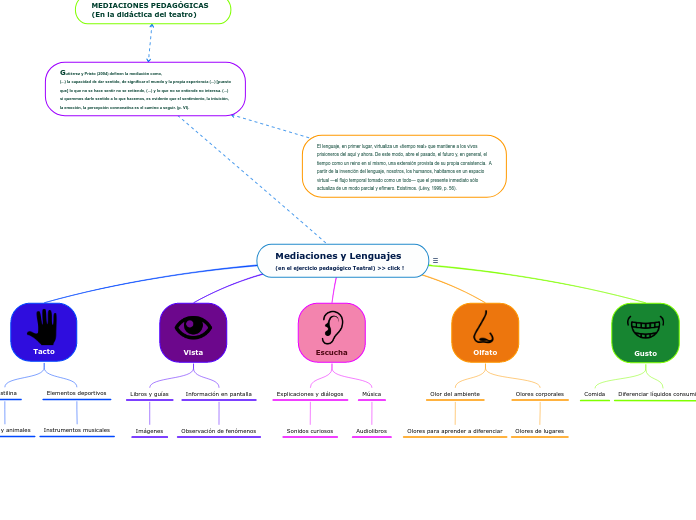von Cesar Del Valle Vor 4 Jahren
388
Mediaciones y Lenguajes (en el ejercicio pedagógico Teatral) >> click !

von Cesar Del Valle Vor 4 Jahren
388

Mehr dazu
“Toda experiencia es mediada —por los mecanismos de la percepción sensorial, la mentalización, el lenguaje, etc.— y, ciertamente, todo el arte consiste en una mediación adicional de la experiencia”. Hakim Bey
Senses send messages through receptor cells to our brain, using our nervous system.
How we taste:
Tongues also have chemical sensors to give a sense of taste.
List a thing you can taste.
Example: cake, chocolate, pizza
How we smell:
Our noses have sensors that detect chemicals that make up a smell.
List a thing you can smell.
Example: laundry detergent on clothes, perfume, food from the restaurant
Add a describing word for that thing.
You can choose from the examples below:
How we hear:
Our ears have sound sensors in the inner ears.
They also have sensors that work on keeping you balanced and aware of where you are in your environment.
List a thing you can hear.
Example: clock ticking, birds chirping
Add a describing word for that thing.
You can choose from the examples below:
How we see:
Our eyes translate light into image signals so the brain can process them.
List a thing you can see.
Example: sunset, picture
Add a describing word for that thing.
You can choose from the examples below:
How we feel:
The receptors from our skin send touch signals to the brain.
List a thing you can feel.
Example: sand, a fine silk coat, a fluffy teddy bear
Add a describing word for that thing.
You can choose from the examples below: